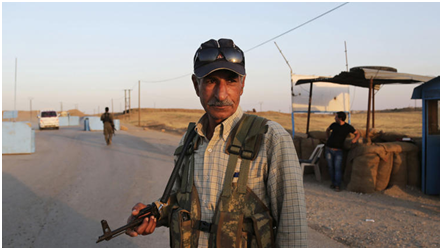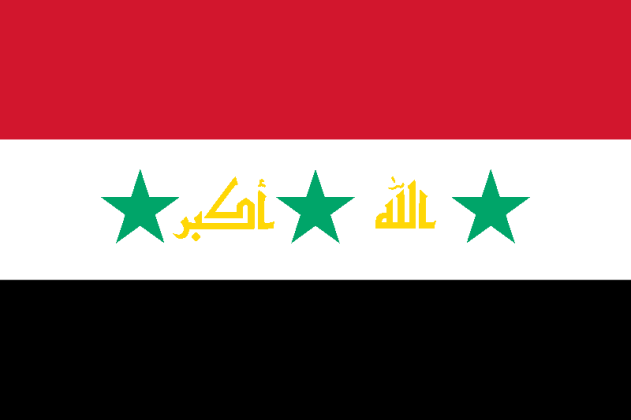Syrian Kurdish Fighters, not Obama, Rescue Yazidis Stranded on Sinjar Mountain
President Obama may be dismissive of the Islamic State (IS) terrorist army, calling them flippantly in a New Yorker interview the equivalent a “JV team putting Lakers uniforms which doesn’t make them the equivalent of Kobe Bryant”. Anything for this President President to avoid calling IS, what it is, a powerful international force of barbarous Salafist Jihadis. A veritable terrorist Army who now control a Caliphate covering a broad swatch of Syria and northern Iraq equipped with hundreds of millions of US and Russian arms captured from fleeing Assad and Iraqi soldiers. All financed with billions in loot and war booty from their blitz-like rampage. IS is currently engaged in ethnic cleansing of Nineveh province.
It is conducting a patent Islamic genocide campaign dispossessing and ousting Christians and Kurdish speaking Yazidis. Yazidis whose ancient Mesopotamian faith preceded Islam.
Hundreds of thousands have fled into the sanctuary of Iraqi Kurdistan. The Kurdish regional Government (KRG) defended by tough peshmerga forces equipped with ancient Russian weapons from the regime of the late Saddam Hussein. As a result of the IS rampage, a combined humanitarian and military crisis occurred in August 2nd with the fall of Sinjar, Iraq and the flight of tens of thousands of Yazidis. The rapid advance of IS in both Syria and Iraq was evident to most observers; the exception being the National Security Staff in the West Wing of the White House. They were deflected by the turmoil of establishing a new government in Baghdad, opposed by Shiite autocrat and PM, Nouri al-Maliki who had deprived the Kurdish regional Government of their fair shares in oil revenues and modern US supplied arms and weapons. In June the President sent in 300 military coordinators and planners, since ramped up to an estimated 800 contingent. US diplomats in the ‘green zone’ in Baghdad and some in Erbil have been flow out to Jordan.
The blame game between the U.S. broke out with sudden capture by IS of Iraq’s second largest city Mosul in mid-June threatening the Iraqi Kurdistan and Peshmerga force. The flimsy excuse offered by President Obama for ordering the limited air assault against advancing IS forces was the threat to US several hundred military coordinators and diplomats in Erbil, the KRG capital. Add to that the humanitarian crisis caused by the flight of more than 45,000 Yazidis to Sinjar Mountain cut off from possible sanctuary in Iraqi Kurdistan.
Watch this WSJ report with Intelligence Journalist Siobhan Gorman on why the US Intelligence community underestimated the sudden rise of IS:
The Presidential order of August 7th initiating limited air strikes against IS forces only dented their progress after capturing the strategic Mosul Dam astride the Tigris River. The IS blitzkrieg came within 30 miles of Erbil, the modern capital of the Iraqi Kurdistan. Humanitarian air drops of water and food by both the US and U.K. to the cowering Yazidi tens of thousands of refugees on the arid 3,000 foot mountain, only provided a brief respite. IS forces seized hundreds of Yazidi women as sex slaves or buried them alive as they are considered infidel polytheists and alleged ‘devil worshippers” under Islamist doctrine. Iraqi Peshmerga fighters were engaged in pushback of IS forces and recapture of towns along their long frontier with the terrorist Caliphate forces. It was left to Syrian Kurdish Peshmerga in adjacent Rojava- their homeland – to come to the rescue of the Yazidis. By August 7th, the same day the President announced the limited air operations and humanitarian air drops Sinjar Mountain, the Syrian Kurdish Peshmerga successfully opened a secure path for Yazidis to come down off the mountain and enter the adjacent area of Syria to safety an eventual re-entry into adjacent KRG.
An AP report, “Syrian Kurdish Fighters Rescuing Stranded Yazidis”, reveals the successful humanitarian corridor created by these Rojava Kurdish Peshmerga fighters without US and UN assistance. Note these excerpts:
While the U.S. and Iraqi militaries struggle to aid the starving members of Iraq’s Yazidi minority with supply drops from the air, the Syrian Kurds took it on themselves to rescue them. The move underlined how they — like Iraqi Kurds — are using the region’s conflicts to establish their own rule.
For the past few days, fighters have been rescuing Yazidis from the mountain, transporting them into Syrian territory to give them first aid, food and water, and returning some to Iraq via a pontoon bridge.
The desperate condition of these stranded Yazidis was described:
“The (Kurdish fighters) opened a path for us. If they had not, we would still be stranded on the mountain,” said Ismail Rashu, 22, in the Newroz camp in the Syrian Kurdish town of Malikiya some 20 miles from the Iraqi border. Families had filled the battered, dusty tents here and new arrivals sat in the shade of rocks, sleeping on blue plastic sheets. Camp officials estimated that at least 2,000 families sought shelter there on Sunday evening.
Nearby, an exhausted woman rocked a baby to sleep. Another sobbed that she abandoned her elderly uncle in their village of Zouraba; he was too weak to walk, too heavy to carry.
Many said they hadn’t eaten for days on the mountain; their lips were cracked from dehydration and heat, their feet swollen and blackened from walking. Some elderly, disabled and young children were left behind. Others were still walking to where Syrian Kurds were rescuing them, they said.
We are thankful, from our heads to the sky, to the last day on earth,” said Naji Hassan, a Yazidi at the Tigris river border crossing, where thousands of rescued Yazidis were heading back into Iraq on Sunday.
The U.N. estimated around 50,000 Yazidis fled to the mountain. But by Sunday, Kurdish officials said at least 45,000 had crossed through the safe passage, leaving thousands more behind and suggesting the number of stranded was higher.
The Syrian Peshmerga swung into action:
Syrian Kurdish officials said soon after Yazidis fled their villages, they began fighting to create a safe passage. They clashed with Islamic State fighters upon entering Iraq, losing at least 9 fighters, but by Aug. 7 had secured a safe valley passage, cramming Yazidis into jeeps, trucks and cars to bring them some 25 miles away. Some of the ill were even rushed to hospital.
“We answered their cries for help. They were in danger and we opened a safe passage for them into safety,” said military official Omar Ali. “We saw that we had to help them and protect them; they are Kurds and part of our nation.”
The AP report noted that autonomy that Syrian Kurds established in Syria that allowed them to undertake this rescue of the Yazidis after the KRG Peshmerga retreated:
In saving Yazidis, Syrian Kurds were also demonstrating their own ambitions for independence as Syria’s civil war rages on.
They announced their autonomous area of Rojava in January, and rule several far northeastern Kurdish areas of Syria. Government forces stationed in the area were redeployed over two years ago to battle rebels seeking Assad’s overthrow, Syrian Kurdish officials said.
But in entering Iraq, the Syrian fighters are also challenging their Iraqi Kurdish rivals. They say they entered after the Iraqi Kurdish fighting force, called the peshmerga, fled Yazidi villages after short battles with Islamic militants. The peshmerga say they were outgunned by the militants.
The gratitude of the Yazidis for the action of the Syrian Kurdish fighters:
For now, with the peshmerga gone and state aid ineffective, the Yazidis who survived the mountaintop ordeal were counting on the Syrian Kurdish fighters. Covered in dust among crowds at the Tigris crossing, Hassan said without the fighters all would have been lost.
“Were it not for them, no Yazidi would be saved,” he said.
If the West is serious about blunting, if not rolling back the IS Jihad blitzkrieg, it must rapidly equip and train both Iraqi and Syrian Kurdish peshmerga with basic small arms, mortars and grenades, as well advanced weapons. The irony is that desperately needed weaponry would be used to destroy US weapons and munitions abandoned by regular Syrian and Iraqi Shiite forces that were slaughtered or fled in panic acquired during the IS rampage. There is an immediate source that could be drawn immediately less than 601 miles away from Kurdistan, the U.S. War Reserve stockpile in Israel. All it takes is for President Obama to authorize the Pentagon to make those draw downs and undertake emergency airlifts to equip and train those tough Peshmerga fighters on the frontlines in both Syria and Iraq.
What did Sir Winston Churchill say about U.S. lend lease efforts prior to our entry into WWII in a radio broadcast on February 9, 1941: “Give us the tools to finish the Job”.
EDITORS NOTE: This column originally appeared on the New English Review. The featured image is of a Syrian Kurdish Peshmerga fighter in Derika, Syria’s Refugee Camp. August 10, 2014 Source: AP Photo/Khalid Mohammed.





